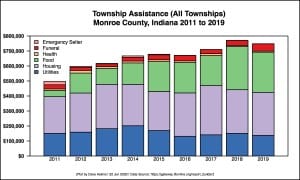Up to $100K in Monroe County rainy day funds to go towards township resident assistance


On the Monroe County council’s work session agenda for Tuesday is the approval of an interlocal agreement that will boost township assistance programs by up to $100,000.
The money would come from the county’s rainy day fund.
County commissioners already gave their approval at their regular meeting on June 17.
The move comes as some rent and utilities moratoriums, related to the COVID-19 health emergency, are set to expire. They’re tied to Indiana governor Eric Holcomb’s executive orders.
In March, the governor ordered a temporary hold on evictions due to non-payment of rent and on utilities shutoffs for non-payment of bills. But both orders are tied to the declaration of the health COVID-19 health emergency, which has been extended a few times, but is now set to expire on July 4.
Also coming to an end soon, on July 31, is the Federal Pandemic Unemployment Compensation program’s benefit that provides an additional $600 per week to people collecting regular unemployment compensation.
The county’s $100,000 of rainy day fund money would supplement the normal assistance programs administered by each of the county’s township governments. Based on Department of Local Government Finance figures, for the nine years from 2011 to 2019, Monroe County’s townships have provided residents with about $6 million in help, for utilities, housing, food, healthcare, funerals and emergency shelter.
Last year, the total assistance provided across all townships was about $750,000. So the extra $100,000 that county government is looking to give the townships would bump their ability to meet their residents’ pandemic-related needs by about 13 percent.
At a late-May work session, Perry Township trustee Dan Combs laid out for county councilors how he and other township trustees are anticipating that there will be a bump in requests for assistance following the ending of the moratoriums.
That’s based on their experience with an existing type of moratorium, that can apply to eligible ballplayers during cold weather, from Dec. 1, through March 15. That disconnect moratorium is administered by South Central Community Action Program, according to Combs.
Based on the bump in requests that townships typically see in April after the end of that moratorium, Combs told county councilors he expects “a surge in applications for assistance in mid‐July to August.”
In his written message to county councilors, Combs said, “While we cannot predict the size of the increase in demand for assistance, it seems clear from our preliminary data check and understanding of the scope of the economic dislocations, that we might assume a substantial demand will appear.”
According to the terms of the interlocal agreement, the county will make an initial transfer of $25,000 to the Monroe County Trustees Association by June 30. Between then and the end of the year, the association can request up to three more $25,000 installments.
Based on initial reaction from county councilors at their work session and the approval already given by county commissioners, the topic is not expected to be controversial.




Comments ()